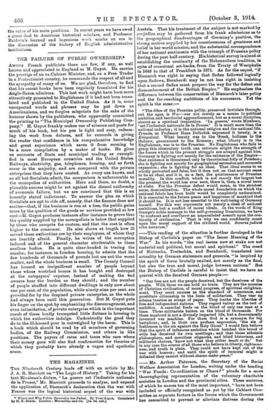THE FAILURE OF PUBLIC OWNERSHIP.* AMONG French publicists there are
few, if any, so well known and appreciated in England as M. Guyot. He carries the prestige of an ex-Cabinet Minister, and, as a Free Trader in a Protectionist country, he commands the respect of all and the sympathy of many of us. We are glad, therefore, to find that his recent books have been regularly translated for his Anglo-Saxon admirers. This last work might have been more attractively presented to Englishmen if it had not been trans- lated and published in the United States. As it is, some unexpected words and phrases may be put down as Americanisms, and we forgive misprints for the sake of the humour shown by the publishers, who apparently committed the printing to " The Municipal Ownership Publishing Com- pany." M. Guyot frankly makes use of scissors and paste for much of his book, but his pen is light and easy, redeem- ing the work from dulness, and he succeeds in giving the reader that confidence in his comprehensive knowledge and great experience which saves it from seeming to be a mere compilation by a maker of books. He gives us accounts of State and municipal trading as exempli- fied in most European countries and the United States. Railways, electricity, gas, telephones, housing, and so forth recur in the majority, and are compared with the private enterprises that they have ousted. As every one knows, and as all but Socialists admit, the comparison is unfavourable to the monopolies of authorities. Here and there, no doubt, a plausible success might be set against the dismal uniformity of economic failure, but we are convinced that this is an honestly stated indictment. To answer the plea on which Socialists are apt to ride off, namely, that the finance does not matter—that, if the business is run at a loss, the public gains more by the qualities of the goods or services provided at low cost—M. Guyot produces instance after instance to prove that the quality supplied by the monopolists is below that supplied by those who compete for custom, and that the cost is often higher to the consumer. He also shows at length how ill served these authorities are by their employees, of whom they are heartily afraid. Finally, he writes of the corruption induced and of the general character attributable to these soulless bodies. He is quite clear-beaded in tracing the results ; for instance, in London housing, he admits that the few hundreds of thousands of pounds lost are not the worst matter, and the whole business is email. The County Council has housed an insignificant number of people beyond those whose wretched homes it has bought and destroyed at the ratepayers' expense, instead of making the bad owners bear the burden as they should; and the number of people shuffled into different dwellings is only now about one per cent. of the population, while ninety-nine per cent. are provided for by the despised private enterprise, as the whole had always been until this generation. But M. Guyot puts his finger on the spot by emphasizing the discouragement, and even intimidation, of private enterprise which is the important result of these loudly trumpeted little flutters in housing in which the authorities indulge. Undoubtedly the good they do to the ill-housed poor is outweighed by the harm. This is a book which should be read by all members of governing bodies, of the Railway Commission, and others in like positions. The payers of rates and taxes who care where their money goes will also find confirmation for theories of which they probably have already a vague and apathetic sense.










































 Previous page
Previous page